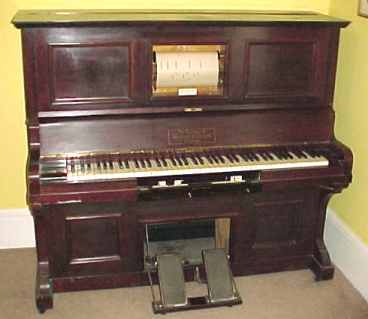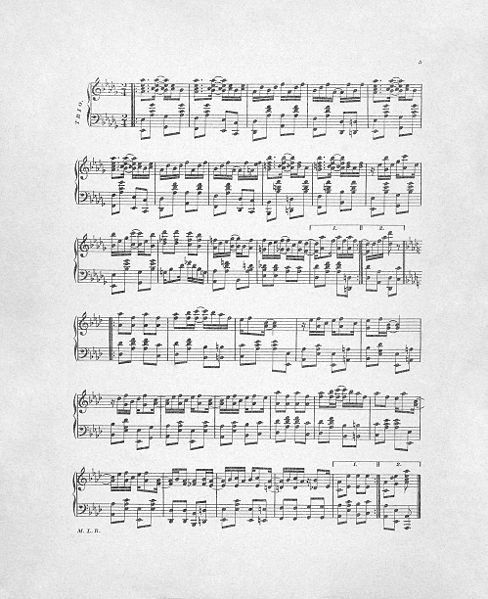Actually, you are failing to see exactly what ragtime is and that it is simply characterized by a syncopated melody with the right hand over normal (not syncopated) but regular bass movements with the left hand. THAT is the recognizable sound heard in ragtime (do you know what "syncopated" means?). Chords are part of ragtime, no doubt, but chords alone do not describe ragtime. YOu can use other musical instruments to play ragtime, even when they cannot play chords at all. There are many rags that use single notes on a piano rather than mostly chords to produce the necessary melody in ragtime. Possum and Taters is a good example of that. So is the first half of Red Pepper - A Spicy Rag. Same for Rose-bud March. The syncopated melody is the really the heart of ragtime along with the left hand bass movements. It is what allows you to recognize it as a ragtime piece for what it is and not about the chords as the identifying feature. You can take the same chords, the progression, and the melody of Marry Had a Little Lamb into a ragtime format. In ragtime it combines the left hand bass movements (the "oom-pah oom-pah" feel to it) while the right hand plays the syncopated movements that produces the melody. If it isn't syncopated, it cannot fall into the ragtime category. Period. Thus the reason why ragtime is called "ragtime" is because the right hand melody plays in "ragged" time. Get it? Or syncopated as they call it.
I never claimed that syncopated music is only exclusive to the ragtime genre but its domain is the heavily syncopated melody with the bass movement of the left hand. That's ragtime. Ever been to parlor and hear ragtime without a piano? Which would play the bass? Which ones would play the ragtime melodic notes?

Joplin played both upright and grand pianos. This has been documented. His background was classical music influenced by his German music teacher where Joplin was exposed early on to classical composition (and even opera). Scott Joplin's family was able to afford a grand piano around 1881 (Joplin was born in 1868) according to ragtime historians. In his earlier years he played on grand pianos while in his formative years he continued to play and compose ragtime on both upright and grand pianos. There is a grand piano replica in Joplin's house (museum) as well. Scott Joplin owned a grand piano, one described by a renowned opera coach as being a "very fine instrument." Also, if you ever get a chance to see the cover of "Pastime Rags" music sheet you will see a grand piano being played by a woman, Eleanor Stark, whose father is the publisher of Scott Joplin's music pieces. Joplin has played on grand pianos in other venues even though uprights was the most used when it came to vaudeville, bordellos, saloons, bars, etc whenever and wherever he played. No doubt. But the big irony in all this is that Joplin's first exposure to piano was a grand piano! His mother, former slave, worked for a white family who had a grand piano. She had to bring Scott Joplin to work (couldn't leave him at home) where he got his first exposure to a piano. His talent was recognized early on on his predisposition to play a piano. Family worked hard to pay (free chores to allow Joplin to play on the grand piano where his mother worked) for Joplin's piano lessons with his German born piano teach who introduced him to classical composition. And that was on a grand piano, too. On his own, he played on uprights and then in his formative productive years played and composed ragtime on both the grand piano and upright. He played much more on upright pianos, sure, but he has played on grand pianos as well. Look up the history of Treemonisha, a ragtime opera (he was influenced by his teacher who was into classical opera, too). So, it's a safe bet that he would've preferred a grand piano. Any serious pianist would more than likely preferred a grand piano. He was at heart in many ways a classical pianist.
Are you a pianist? Not likely at it would seems.
Still, there were many ragtime pieces composed with a grand piano in mind, or so it seems. This can be seen in 1900s to 1910s music piece whose cover arts showed a grand piano - a preferred piece of instrument to play ragtime on. I've seen multiples of these ragtime covers with a grand piano on it. So, ragtime was indeed played on grand pianos. Not everybody was poor or couldn't afford a grand piano. Ragtime was played everywhere, and not just exclusively in back alleys and saloons of which you seem to strongly infer.
Now, let me say this to you. Do not assume what I can or cannot hear. I play. I hear the music. I hear all of the notes. The chords. Even the mistakes. And when I hear the mistakes whenever I play and I correct them. In ragtime sometimes chords would sound a bit off and I have to look again to make sure I had my fingers in the right position or if I missed a flat or a sharp key but it would turn out that my fingers placement were indeed correct and that's how it was written. It's a part of the flavor of ragtime. Once you play it at a regular speed the whole sound comes out really well. And, yes, my piano is tuned! So, leave that one out.
So, What is your background in music? Do you play the piano? Organ? Clarinet? Or do you just simply play the kazoo and pretend to be the band leader? Are you an experienced musicologist? what? It is already obvious that you do not understand what ragtime is about, nor the complexity of it either. Or that there are numerous styles under ragtime. Or how it overlapped and progressed into novelty pianos, early jazz and even into the blues. One influencing the others somehow. Ragtime has been romanticized over time thinking its' all about "tinny" pianos, or the honky-tonk versions. Don't let those Hollywood films mislead you. But if you don't play the piano or don’t even discuss or know ragtime as part of your ragtime experience then why should I even take you seriously in this discussion?
Oh please, spare me.
























